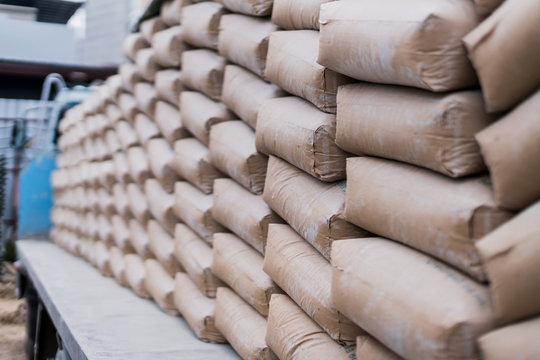
The rising cost of building materials is triggering abandoned projects, posing significant threats to the construction sector, and exacerbating the existing housing deficit gap, JOSEPHINE OGUNDEJI writes
The recent surge in cement prices has reverberated throughout the real estate market, sparking an unexpected increase in property abandonment.
Cement, as a fundamental building material, has seen its prices skyrocket due to a combination of factors, including supply chain disruptions and heightened demand. This surge has placed considerable strain on both property developers and homeowners, leading to a worrying trend of abandoned properties.
For property developers, the spike in cement prices presents a formidable challenge. The increased construction costs force developers to grapple with the decision of either absorbing the additional expenses, risking reduced profits, or passing them onto consumers through higher property prices.
In regions already struggling with affordability issues, such cost escalations further compound the challenges of accessing homeownership, potentially dampening demand.
Homeowners, on the other hand, find themselves burdened with escalating maintenance and renovation costs as a result of the cement price surge. Many homeowners are now faced with the dilemma of whether to invest in costly repairs or abandon their properties altogether. For some, the financial strain of upkeep outweighs the perceived value of their homes, leading to a growing number of abandoned properties across various communities.
Last the years
Sunday PUNCH findings showed that the prices of cement ranged between N3,300 and N3,500 in Lagos and Ogun states in March 2021 but jumped to between N6,500 and N8,000 in both states as of the first week of February.
Dangote Cement’s Group Executive Director in charge of Strategy, Portfolio Development, and Capital Projects, Devakumar Edwin, had in 2021 attributed the high cost of cement in Nigeria to the global rise in demand for cement as a result of the COVID-19 crisis.
“Nigeria is no exception as a combination of monetary policy changes and low returns from the capital market has resulted in a significant increase in construction activity. To ensure that we meet local demands, we had to suspend exports from our recently inaugurated export terminals, thereby foregoing dollar earnings,” he said.
In 2022, the Block and Concrete Producers Association, Enugu State chapter, decried the continuous increase in the prices of cement and other materials used for block production.
The President of the association in the state, Igwe Ukaegbu, had lamented that the continuous rise in cement price was negatively affecting the production output of and income of members of the association, urging the Federal Government to intervene in the situation by granting more licences to industrialists to produce cement.
“The challenge we have is the cost of cement and even sand. Everything is now costly. We are not making sales as we used to; so, we are suffering. We are praying for the government to help us by bringing down the prices of cement and other materials.
“Before, one could sell 3,000 to 5,000 pieces of block in a month; but now, before you sell 1,000 pieces of block, it is very difficult. The cost of cement in Enugu now is N4,550 per bag. Some people are selling for N5,000.”
In 2023, the Cement Producers Association of Nigeria warned that the ongoing plan of the Federal Government to introduce concrete roads could raise the price of cement to N9,000 per bag from the current price of N5,000.
They also called on the current administration, in a statement, to permanently address the perennial cement price hike problem by facilitating larger participation in the cement industry, noting that Nigerians had no business buying cement for more than N5,600 per bag.
The statement read in part, “Our findings from various parts of the country show that cement sells for as high as N6,000 per bag in the rainy season. Our prediction is that it will sell for over N9,000 per bag in the dry season, especially with the pronouncement of the Minister of Works on cement technology and the marching order on housing by Mr. President if the government does not take proactive steps.
“While we commend the minister’s position on cement-made roads, we warn of the dire consequences if the supply end is not properly addressed. It would amount to a dereliction of duty not to intervene, and the time is now.
“To do otherwise is to continue in a worsening pipe dream that prices would suddenly drop on this essential input that will continue to drain the purse of Nigerians, render them homeless, encourage chaos between demand and supply, and worsen the infrastructure deficit it sets out to cure, and lead to an unprecedented price hike.”
However, in 2024, the hopes for reduced construction expenses for aspiring homeowners might turn into a distressing reality, considering the recent surge in cement prices initiated by producers last week.
This uptick has already set off a chain reaction in the market, leading to over a 100 per cent increase in prices within a short time. As a result, some property developers have ceased their construction projects, and individuals constructing their residences are pursuing variations in their contracts.
Findings by our correspondent showed that operators within the Cement Manufacturers Association of Nigeria increased the prices of the product. Consequently, retail prices increased from N7,000 to N9,500, and N13,000 nationwide as of Wednesday, February 21, 2024.
Developers groan
A bricklayer, Asumo Tyler, told Sunday PUNCH that he was shocked when he realised that he had to pay N6,500 or N7,000, depending on the area, for the same bag of cement he bought at N5,300 the previous week, a development he said had halted his hope of owning a home.
He said, “I am currently building my house. I had to stop building because of this increase, I was initially thinking the price would come down, till the shock I received upon purchase last week.”
Similarly, the Chief Executive Officer of Magnificent Choice Services Project and Engineering Ltd, Jeremiah Akinsele, said his firm had to stop all the projects it was working on presently, renegotiating terms with the clients involved.
He said, “It has been difficult as we had to stop all works for renegotiation purposes, all building materials gone up. We bought cement at N7,300 on Wednesday, February 7, in Sagamu, Ogun State. The confusing part is that most of the components of cement are sourced locally; I do not know why the impact of the dollar is so huge on the increase.
“As the prices of construction materials soar, exemplified by the surge in iron prices from N500,000 to N800,000, there is a looming risk of projects being abandoned. This is especially troubling as we continue striving to bridge the housing deficit gap.”
In an exclusive interview with our correspondent, the President, African Real Estate Society, Kunle Awolaja, said the increase would bring up the cost of construction.
He said, “Once construction goes up, it is going to impact rents and property developments in the market. However, the way forward is once the foreign exchange issue comes down, we go for local raw materials.
“This is where the issue comes in. What are the local raw materials we have? Are we going to work with clay, and can we have mass production of these local materials? For now, the answer would be no. We should work with what we have.”
Also, the Managing Director of Fame Oyster & Co. Nigeria, Femi Oyedele, said since cement constituted about 50 per cent of the constituents of building materials and building elements in Nigeria, the increase would lead to an abandonment of properties.
He said, “Blocks are for walling, plastering and rendering of walls, screeding of floors, fixing of tiles, fixing of sanitary wares, etc. The increase in cement from N5,500 to N7,000 will affect the rate of construction starts. A lot of prospective property developers will hesitate to start construction and this will also affect sales of building materials. In the long run, it will affect the rental value of properties.
“The uptick in cement prices is anticipated to lead to a rise in abandoned properties, as numerous individuals already amid construction projects may opt to cease their endeavors. Furthermore, low-income earners may hesitate to embark on construction of their homes given the current economic conditions.”
Inflation
However, according to findings by Sunday PUNCH, cement companies, including BUA which had previously announced a reduction in ex-factory cement price to N3,500 per bag in October, reversed course and increased their rates due to a surge in production costs.
A cement dealer in Ogba, Lagos, Segun Abiola, pointed out that the increasing transport expenses and the devaluation of the naira were key factors behind the surge in prices. He highlighted the limited authority that dealers possessed in determining pricing.
Meanwhile, a cement vendor in the Iyana-Ipaja area of Lagos, Moshood Alimi, who revealed that a bag of Dangote cement was sold at N6,800 and Lafarge at N6,700, lamented his inability to stock cement due to the exorbitant cost of transporting them to Lagos, which he said would inflate the price per bag to as high as N7,500.
A building contractor, Seun Afolabi, while voicing his concerns over the detrimental impact of the cement price surge on the construction sector, highlighted the plight of aspiring homeowners who are now finding it increasingly challenging to afford the higher prices.
The story is not different from the experience of a developer, Opemipo Awoyeye, in the Sagamu area of Ogun, who stated that as of Monday, February 12, cement prices had skyrocketed to N8,000 per bag, signifying a substantial surge in cost.
Meanwhile, another developer based in the Obalende region of Lagos, informed Sunday PUNCH that cement prices fluctuated between N9,000 and N9,500, depending on the location, as of Friday, February 16, 2024.
Housing deficit remains
The amount required to fund the housing sector in Nigeria and bridge the estimated 28 million housing deficit across the country is N21tn, the Federal Government said through the Bank of Industry.
In a report on Nigeria’s housing sector put together by BOI, the bank explained that “with a growing urban population, increasing construction costs, and declining household income, access to affordable housing is becoming more difficult for millions of citizens.”
The report, titled, “Institutional turnaround for the next level,” and obtained by our correspondent from the Federal Mortgage Bank of Nigeria, stated that while N470bn was what the Federal Government budgeted for housing in 2022, the sector would require trillions of naira to close Nigeria’s housing gap.
It stated that of the estimated 206 million persons in Nigeria, about 95.1 million lived below the poverty line, and as such it was difficult for them to have access to their own homes.
Under the section on Nigerian Housing Market in the report, the bank said, “N21trn (is the) amount required to fund the housing sector,” adding that “28 million units (is the estimated) housing deficit.”
Operators react
Following the recent uptick in cement prices nationwide, the President of the Real Estate Developers’ Association of Nigeria, Dr Aliyu Wamakko, appealed to the President of the Federal Republic of Nigeria, Bola Tinubu, to urgently convene discussions with cement manufacturers, adding that the goal was to mitigate further hardships for Nigerians.
Wamakko, speaking in Abuja on Wednesday, expressed deep concern over the intensified economic strain, highlighting that the price hike implemented by manufacturers in early January was unfavorable for both Nigerians and real estate developers.
“The price of ready-mix concrete will also be increased while the cost of in-situ production of concrete will rise significantly. Such an increment, if allowed to take place, will worsen the economic situation of the nation,” he said.
The DEDAN president said regular construction creates multiple employment opportunities which help to reduce the poverty index of the country as such the hike in the price of cement could come with undesirable consequences.
“The resultant effects of unemployment are banditry, kidnapping, and armed robbery. The federal government should also remember that we have a 28 million housing deficit in Nigeria. Cement is an essential ingredient in the production of buildings,” Wamakko added.
In an exclusive interview with Sunday PUNCH, the Executive Secretary of the Association of Housing Corporations of Nigeria, Toye Eniola, voiced apprehensions about the ongoing surge in cement prices, warning that it could spell the end of affordable housing prospects.
He said, “Why is it that it is the price of cement that is going up when about 90 per cent of building materials are available locally? But then the argument is that the cost of running the business has gone up, and we know that the economy is driven by the fluctuating forex which is affecting the operation.
“If those running the building material business have to use diesel it would be expensive because a litre of diesel is about N1,000. Hence, we cannot blame the manufacturers, but the policies in place.”
He, therefore, called on stakeholders to look inward and focus on local building materials.
“In the olden days, people made use of mortal bricks to build, and we still have interlocking blocks, among others, which make use of five per cent of cement. It is high time we began to embrace these technologies to build houses because it is the only thing that can instill hope in people.”
No justification for price increase – Minister
In a bid to stem the rising cost of cement and other building materials and enhance the delivery of affordable housing in Nigeria, the Minister of Housing and Urban Development, Ahmed Dangiwa, recently called for a meeting with manufacturers of cement and other building materials in the country.
He also queried the recurring disproportionate increase in the price of cement in particular, especially considering that cement producers in the country sourced virtually all their raw materials locally.
Dangiwa said, “It is disheartening to see how much Nigerians have to pay for essential building commodities like cement, with the prices rising almost daily. I don’t understand the reason for this increase, and it is not acceptable.
“I am going to be meeting with these manufacturers soon so that they can explain to Nigerians their reasons for such incessant hikes. I know that cement producers source their raw materials in Nigeria; (these include) limestone, clay, silica sand, gypsum, iron ore, and the rest. These minerals abound in Nigeria and these manufacturers get them here, so there is no justification to try and blame it all on the rise of the dollar.”
He further assured that the government would create a conducive environment for the private sector to thrive, including through ensuring building materials are affordable and accessible.
It was earlier reported that cement manufacturers had agreed to sell a 50kg bag of cement at a retail price of between N7,000 and N8,000, depending on location nationwide, in their meeting with the Federal Government.
However, developers in the built environment rejected the price, asserting that the price negotiation reached was for the rich.
In an interview with our correspondent, the Executive Secretary of the Association of Housing Corporation in Nigeria, Toye Eniola, condemned the negotiation.
He said, “What is fair in N7,000 to N8,000, when BUA promised us a slash from over N5,500 to N3,500 and now they are negotiating N8,000? Where are we heading for?
“That negotiation is for the rich. What they are saying is with that price, housing is going not to be for the poor. With that price, there is no poor man that would be able to afford it and it would keep widening the deficit gap.
“The way forward is to go back to the basics, this is the time to embrace local building materials. For instance, we have interlocking blocks and we require about five per cent of cement for this which would save us a lot of money.
“Nigerian Building and Road Research Institute has done a lot of research on alternative building materials that can be used in Nigeria. For instance, they have researched the use of bamboo as an alternative to the iron rod.”





